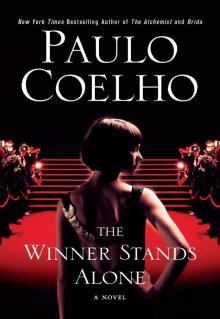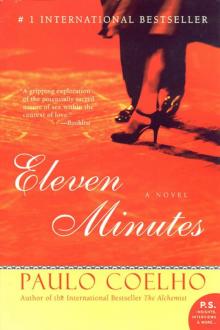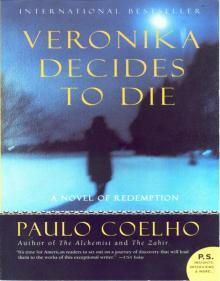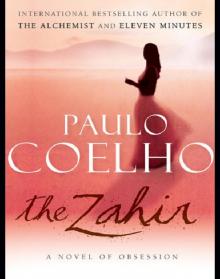- Home
- Paulo Coelho
The Winner Stands Alone Page 3
The Winner Stands Alone Read online
Page 3
Yes, it would be madness on his part to fire that gun on a sunny morning, with cars driving past outside, people going to the beach, the traffic getting heavier by the minute, and more pedestrians walking along the pavement. Best to do as the man says, even if only because she's in no state to do anything else; she's almost fainting.
She obeys. Now she just has to convince him that she's not a threat, to listen to his deserted husband's lament, to promise him that she has seen nothing, and then, as soon as a policeman appears, doing his usual round, throw herself to the ground and scream for help.
"I know exactly what you're feeling," the man says, trying to calm her. "The symptoms of fear have been the same since the dawn of time. They were the same when men had to face wild beasts and they continue to be so right up to the present day: blood drains away from the face and the epidermis, protecting the body and avoiding blood loss, that's why people turn pale. The intestines relax and release everything, so that there will be no toxic matter left contaminating the organism. The body initially refuses to move, so as not to provoke the beast in question by making any sudden movement."
"This is all a dream," thinks Olivia. She remembers her parents, who should have been here with her this morning, but who had been up all night making jewelry because the day looked likely to be a busy one. A few hours ago, she had been making love with her boyfriend, whom she believed to be the man of her life, even though he sometimes hit her; they reached orgasm simultaneously, something that hadn't happened for a long time. After breakfast, she decided not to take her usual shower because she felt free and full of energy and pleased with life.
No, this can't be happening. She must try to appear calm.
"Let's talk. The reason you bought all my stuff was so that we could talk. Besides, I wasn't getting up in order to run away."
He presses the barrel of the gun gently against the girl's ribs. The elderly couple pass by, glance at them, and notice nothing odd. "There's that Portuguese girl," they think, "trying, as usual, to impress some man with her dark eyebrows and childlike smile." It's not the first time they've seen her with a strange man, and this one, to judge by his clothes, has plenty of money.
Olivia fixes them with her eyes, as if trying to tell them what's going on just by looking. The man beside her says brightly:
"Good morning."
The couple move off without uttering a word. They're not in the habit of talking to strangers or of exchanging greetings with street vendors.
"Yes, let's talk," says the Russian, breaking the silence. "I'm not really going to try and disrupt the traffic. I was just giving that as an example. My wife will realize I'm here when she starts to receive the messages. I'm not going to take the obvious route, which would be to go and meet her. I need her to come to me."
This was a possible way out.
"I can deliver the messages, if you like. Just tell me which hotel she's staying at."
The man laughs.
"You suffer from the youthful vice of thinking you're cleverer than everyone else. The moment you left here, you'd go straight to the police."
Her blood freezes. Are they going to sit on this bench all day? Is he going to shoot her after all, now that she knows his face?
"You said you weren't going to shoot."
"I promised I wouldn't if you behaved in a more adult fashion and with due respect for my intelligence."
He's right. The adult thing to do would be to talk a little about herself. She might arouse the compassion that is always there in the mind of a madman by explaining that she's in a similar situation, even though it isn't true.
A boy runs past, an iPod in his ears. He doesn't even turn to look at them.
"I live with a man who makes my life hell, and yet I can't leave him."
The look in Igor's eyes changes.
Olivia thinks she's found a way of escaping from the trap.
"Be intelligent. Don't just give up; think of the woman who's married to the man sitting next to you. Be honest."
"He's cut me off from my friends. He's always jealous even though he can get all the women he wants. He criticizes everything I do and says I have no ambition. He even takes the little money I earn as commission."
The man says nothing but stares at the sea. The pavement is filling up with people; what would happen if she just got to her feet and ran? Would he shoot her? Is it a real gun?
She senses that she has touched on a topic of possible interest to him. It would be best not to do anything foolish, she thinks, remembering the way he spoke and looked at her minutes before.
"And yet, you see, I can't bring myself to leave him. Even if I were to meet the kindest, richest, most generous man in the world, I wouldn't give my boyfriend up for anything. I'm not a masochist, I take no pleasure in these constant humiliations, I just happen to love him."
She feels the barrel of the gun pressing into her ribs again. She has said the wrong thing.
"I'm not like that scoundrel of a boyfriend of yours," he says, his voice full of loathing now. "I worked hard to build up what I have. I worked long and hard, and survived many a setback. I was always honest in my dealings, although there were, of course, times when I had to be hard and implacable. I was always a good Christian. I have influential friends, and I've always been grateful to them. In short, I did everything right.
"I never harmed anyone who got in my way. Whenever possible, I encouraged my wife to do what she wanted to do, and the result: here I am, alone. Yes, I killed people during the idiotic war I was sent to fight, but I never lost my sense of reality. I'm not one of those traumatized war veterans who goes into a restaurant and machine-guns people. I'm not a terrorist. Of course, I could say that life has treated me unfairly and taken from me the most important thing there is: love. But there are other women, and the pain of love always passes. I need to act, I'm tired of being a frog slowly boiling to death."
"If you know there are other women and you know that the pain of love will pass, why are you so upset?"
Yes, she's behaving like an adult now, surprised at the calm way in which she's trying to deal with the madman by her side.
He seems to waver.
"I don't really know. Perhaps because I've been abandoned once too often. Perhaps because I need to prove to myself just what I'm capable of. Perhaps because I lied, and there is only one woman for me. I have a plan."
"What plan?"
"I told you before. I'm going to keep destroying worlds until she realizes how important she is to me and that I'm prepared to run any risk in order to get her back."
The police!
They both notice the police car approaching.
"I'm sorry," says the man. "I intended to talk a little more. Life hasn't treated you very fairly either."
Olivia realizes this is the end. And since she now has nothing to lose, she again tries to get up. Then she feels the hand of that stranger on her right shoulder, as if he were fondly embracing her.
Samozashchita Bez Orujiya, or Sambo, as it is better known among Russians, is the art of killing swiftly with one's bare hands, without the victim realizing what is happening. It was developed over the centuries, when peoples or tribes had to confront invaders unarmed. It was widely used by the Soviet state apparatus to eliminate people without leaving any trace. They tried to introduce it as a martial art in the 1980 Moscow Olympics, but it was rejected as being too dangerous, despite all the efforts of the Communists of the day to include in the Games a sport which they alone practiced.
Perfect. That way, only a few people know the moves.
Igor's right thumb is pressing down on Olivia's jugular vein, and the blood stops flowing to her brain. Meanwhile, his other hand is pressing on a particular point near her armpit, causing the muscles to seize up. There are no contractions, it's merely a question of waiting two minutes.
Olivia appears to have gone to sleep in his arms. The police car drives by behind them, using the lane that is closed to other traffic. They
don't even notice the embracing couple; they have other things to worry about this morning, like doing their best to keep the traffic moving--an impossible task if carried out to the letter. The latest call over the radio tells them that some drunken millionaire has just crashed his car a mile or so away.
Still supporting the girl, Igor bends down and uses his other hand to pick up the cloth spread out in front of the bench and on which all those tasteless objects were to be displayed. He adroitly folds up the cloth to form an improvised pillow.
When he sees that no one else is around, he tenderly lays her inert body on the bench. She looks as if she were asleep; and in her dreams she must be remembering some particularly lovely day or else having nightmares about her violent boyfriend.
Only the elderly couple had noticed them sitting together. And if the crime were discovered--which Igor doubted, since there were no visible marks--they would describe him to the police as fairer or darker or older or younger than he really was; there wasn't the slightest reason to be worried; people never pay much attention to what's going on around them.
Before leaving, he plants a kiss on the brow of the sleeping beauty and murmurs:
"As you see, I kept my promise. I didn't shoot."
HE TAKES A FEW STEPS and his head begins to ache terribly. This is perfectly normal: the blood is flooding the brain, an understandable reaction in someone who has just been under extreme tension.
Despite the headache, he feels happy. Yes, he has done what he set out to do.
He can do it. And he's happier still because he has freed the soul from that fragile body, freed a spirit incapable of defending herself against a bullying coward. If her relationship with her boyfriend had continued, the girl would have ended up depressed and anxious and devoid of all self-respect, and would have been even more under her boyfriend's thumb.
This had never been the case with Ewa. She had always been capable of making her own decisions. He had given her both moral and financial support when she decided to open her haute-couture boutique; and she had been free to travel as much as she wanted. He had been an exemplary man and husband. And yet, she had made a mistake: she had been unable to understand his love or his forgiveness. He hoped, however, that she would receive these messages; after all, he had told her on the day she left that he would destroy whole worlds to get her back.
He picks up the throwaway mobile phone he has just bought and on which he has entered the smallest possible amount of credit. He sends a text message.
11:00 A.M.
It all began, they say, with an unknown nineteen-year-old posing in a bikini for photographers who had nothing better to do during the 1953 Cannes Festival. She immediately shot to stardom, and her name became legendary: Brigitte Bardot. And now others think they can do the same. No one understands the importance of being an actress; beauty is the only thing that counts.
That's why women with long legs and dyed hair, the bottle blondes of this world, travel hundreds or even thousands of miles to be in Cannes, even if only to spend the whole day on the beach, hoping to be seen, photographed, discovered. They want to escape from the trap that awaits all women: becoming a housewife, who makes supper for her husband every evening, takes the children to school every day, and tries to dig up some dirt on her neighbors' monotonous lives so as to have something to gossip about with her friends. What these women want is fame, glory, and glamour, to be the envy of the other people who live in their town and of the boys and girls who always thought of them as ugly ducklings, unaware that they would one day grow up to be a swan or blossom into a flower coveted by everyone. They want a career in the world of dreams even if they have to borrow money to get silicone breast implants or to buy some newer, sexier outfits. Drama school? Forget it, good looks and the right contacts are all you need. The cinema can work miracles, always assuming, of course, you can ever break into that world. Anything to escape from the prison of the provincial city and the long, dreary, repetitive days. There are millions of people who don't mind that kind of life, and they should be left to live their lives as they see fit. However, if you come to the Festival you must leave fear at home and be prepared for anything: making spur-of-the-moment decisions, telling lies if necessary, pretending to be younger than you are, smiling at people you loathe, feigning an interest in people who bore you, saying, "I love you" without a thought for the consequences, or stabbing in the back the friend who once helped you out, but who has now become an undesirable rival. Don't let feelings of remorse or shame get in your way. The reward is worth any amount of sacrifice.
Fame. Glory. Glamour.
Gabriela finds these thoughts irritating. It's definitely not the best way to start a new day. Worse, she has a hangover.
At least there's one consolation. She hasn't woken up in a five-star hotel next to a man telling her to put her clothes on and leave because he has important business to deal with, like buying or selling films.
She gets up and looks around to see if any of her friends are still in the apartment. Needless to say they're not. They've long since left for the Boulevard de la Croisette, for the swimming pools, hotel bars, yachts, possible lunch dates, and chance meetings on the beach. There are five fold-out mattresses on the floor of the small shared apartment, hired for the duration at an exorbitant rent. The mattresses are surrounded by a tangle of clothes, discarded shoes, and hangers that no one has taken the trouble to put back in the wardrobe.
"The clothes take up more room here than the people," she thinks.
Not that any of them could even dream of wearing clothes designed by Elie Saab, Karl Lagerfeld, Versace, or Galliano, but what they have nevertheless takes up most of the apartment: bikinis, miniskirts, T-shirts, platform shoes, and a vast amount of makeup.
"One day I'll wear what I like, but right now, I just need to be given a chance," she thinks.
And why does she want that chance?
Quite simple. Because she knows she's the best, despite her experience at school--when she so disappointed her parents--and despite the challenges she's faced since in order to prove to herself that she can overcome difficulties, frustrations, and defeats. She was born to win and to shine, of that she has no doubt.
"And when I get what I always wanted, I know I'll have to ask myself: do they love and admire me because I'm me or because I'm famous?"
She knows people who have achieved stardom on the stage and, contrary to her expectations, they're not at peace with themselves; they're insecure, full of doubts, unhappy as soon as they come offstage. They want to be actors so as not to have to be themselves, and they live in fear of making the one false step that could end their career.
"I'm different, though. I've always been me."
Is that true? Or does everyone in her position think the same?
SHE GETS UP AND MAKES herself some coffee. The kitchen is a mess, and none of her friends has bothered to wash the dishes. She doesn't know why she's woken up in such a bad mood and with so many doubts. She knows her job, she's devoted herself to it heart and soul, and yet it's as if people refuse to recognize her talent. She knows what human beings are like, too, especially men--future allies in a battle she needs to win soon, because she's twenty-five already and nearly too old for the dream factory. She knows three things:
(a) that men are less treacherous than women;
(b) that they never notice what a woman is wearing because they're always mentally undressing her;
(c) that as long as you've got breasts, thighs, buttocks, and belly in good trim, you can conquer the world.
Because of those three things, and because she knows that all the other women she's competing with try to emphasize their attributes, she pays attention only to item (c) on her list. She exercises and tries to keep fit, avoids diets, and, illogical though it may seem, dresses very discreetly. This has worked well so far, and she can usually pass for younger than her age. She's hoping that it'll do the trick in Cannes too.
Breasts, buttocks, thighs. They c
an focus on those things now if they want to, but the day will come when they'll see what she can really do.
She drinks her coffee and begins to understand her bad mood. She's surrounded by some of the most beautiful women on the planet! She certainly doesn't consider herself ugly, but there's no way she can compete with them. She needs to decide what to do. She had thought long and hard before making this trip, money is tight, and she doesn't have much time in which to land a contract. She went to various places during the first two days, giving people a copy of her CV and her photos, but all she achieved was an invitation to last night's party at a cheap restaurant, with the music at full blast, and where she met no one from the Superclass. In order to lose her inhibitions, she drank more than she should and ended up not knowing where she was or what she was doing there. Everything seemed strange to her--Europe, the way people dress, the different languages, the phony jollity--when the truth was everyone was wishing they could have been invited to some more important event, instead of being in that utterly insignificant place, listening to the same old music, and having to hold shouted conversations about other people's lives and the injustices committed by the powerful on the powerless.
Gabriela is tired of talking about these so-called injustices. That's simply the way it is. They choose the people they want to choose and don't have to explain themselves to anyone, which is why she needs a plan. A lot of other young women with the same dream (but not, of course, with as much talent as she) will be doing the rounds with their CVs and their photos; the producers who come to the Festival must be inundated with portfolios, DVDs, business cards.
What would make her stand out?
She needs to think. She won't get another chance like this, largely because she's spent all her savings on this trip. And--horror of horrors--she's getting old. She's twenty-five. This is her last chance.
While she drinks her coffee, she looks through the small kitchen window at the dead-end street down below. All she can see is a tobacconist's and a little girl eating chocolate. Yes, this is her last chance. She hopes it will turn out quite differently from the first one.
She thinks back to when she was eleven years old and performing in her first school play at one of the most expensive schools in Chicago. Her subsequent desire to succeed was not born of the unanimous acclaim she received from the audience, composed of fathers, mothers, relatives, and teachers. Far from it. She was playing the Mad Hatter in Alice in Wonderland. She had got the part--one of the best roles in the play--after auditioning along with a lot of other girls and boys.

 The Alchemist
The Alchemist Maktub
Maktub Like the Flowing River
Like the Flowing River The Winner Stands Alone
The Winner Stands Alone The Spy
The Spy By the River Piedra I Sat Down and Wept: A Novel of Forgiveness
By the River Piedra I Sat Down and Wept: A Novel of Forgiveness Eleven Minutes
Eleven Minutes Manuscript Found in Accra
Manuscript Found in Accra Warrior of the Light
Warrior of the Light Veronika Decides to Die: A Novel of Redemption
Veronika Decides to Die: A Novel of Redemption The Devil and Miss Prym: A Novel of Temptation
The Devil and Miss Prym: A Novel of Temptation The Valkyries: An Encounter With Angels
The Valkyries: An Encounter With Angels Brida: A Novel
Brida: A Novel Fifth Mountain: A Novel
Fifth Mountain: A Novel Adultery
Adultery Inspirations
Inspirations The Archer
The Archer The Witch of Portobello
The Witch of Portobello The Pilgrimage
The Pilgrimage The Zahir
The Zahir Brida
Brida The Fifth Mountain
The Fifth Mountain Like the Flowing River: Thoughts and Reflections
Like the Flowing River: Thoughts and Reflections Manual of the Warrior of Light
Manual of the Warrior of Light By The River Piedra I Sat Down & Wept
By The River Piedra I Sat Down & Wept The Supreme Gift
The Supreme Gift Aleph
Aleph Hippie
Hippie Witch of Portobello
Witch of Portobello The Devil and Miss Prym
The Devil and Miss Prym The Alchemist - 10th Anniversary Edition
The Alchemist - 10th Anniversary Edition The Valkyries
The Valkyries